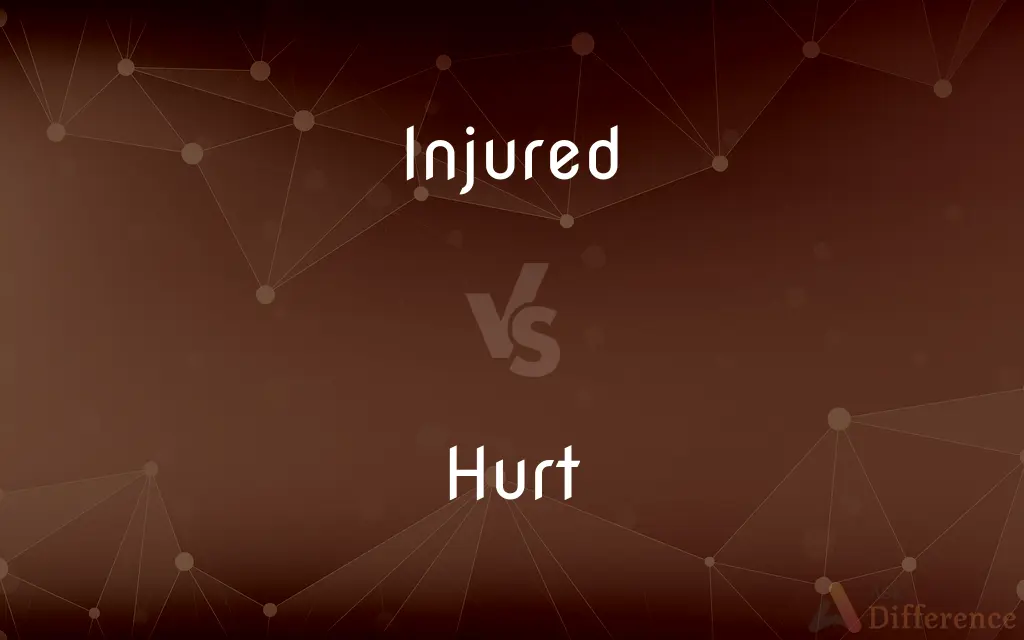Injured vs. Hurt — What's the Difference?
By Tayyaba Rehman & Maham Liaqat — Updated on March 13, 2024
"Injured" often implies a physical harm caused by an accident or violence, requiring medical attention, whereas "hurt" is more general, denoting physical pain, emotional suffering, or offense, and can be less severe.

Difference Between Injured and Hurt
Table of Contents
ADVERTISEMENT
Key Differences
Injury typically refers to physical damage to the body caused by external forces, such as accidents, falls, or violent acts. It suggests a certain level of severity that might necessitate medical evaluation or intervention. For example, broken bones, deep cuts, or concussions are commonly described as injuries. On the other hand, hurt encompasses both physical pain and emotional distress. It can describe anything from a minor scrape or bruise to feelings of emotional pain, such as sadness or offense. The term "hurt" is versatile and can be used in various contexts, not necessarily requiring medical treatment.
While "injured" often points to a specific physical condition with visible signs or symptoms, "hurt" can be subjective, referring to internal sensations of pain or discomfort, either physically or emotionally. For instance, one might feel hurt by a friend's harsh words, which would not be described as an injury.
In the context of severity and implications, injuries are typically more serious and may involve a longer recovery process, potentially affecting one’s lifestyle or ability to perform certain tasks. Conversely, being hurt might not always have long-term implications and could refer to temporary pain or emotional upset that resolves with time or minimal intervention.
The use of "injured" is more common in formal contexts, such as medical reports, legal documents, and news articles, especially when detailing accidents or incidents with physical harm. "Hurt," however, is used more broadly in everyday language to express a range of physical and emotional experiences.
In summary, while both terms relate to experiences of pain, "injured" is more specific to physical harm of a more serious nature, often requiring medical attention, whereas "hurt" is a broader term that can refer to physical discomfort, emotional pain, or both, with varying degrees of severity.
ADVERTISEMENT
Comparison Chart
Definition
Physical harm to the body, often serious.
Physical pain or emotional suffering, can be minor or severe.
Context
Often requires medical attention.
May not require medical intervention.
Severity
Typically more serious, with potential long-term effects.
Can range from minor to severe, often with temporary effects.
Usage
Common in formal contexts like medical and legal documents.
Used broadly in everyday language for various types of pain.
Examples
Broken bones, deep lacerations.
Scrapes, bruises, feelings of sadness or offense.
Compare with Definitions
Injured
Involves physical damage, often visible.
She was injured in a car accident, suffering from a fractured arm.
Hurt
Can refer to both physical pain and emotional distress.
She felt hurt after being excluded from the group.
Injured
Usually requires professional medical evaluation.
Injured athletes often undergo extensive rehabilitation.
Hurt
Used in various contexts, not limited to physical harm.
Careless words can hurt someone's feelings deeply.
Injured
Often results from accidents, violence, or specific incidents.
Workers can get injured due to unsafe working conditions.
Hurt
Often describes pain that is less severe and more temporary.
His feelings were hurt, but he quickly moved on.
Injured
Might involve a lengthy recovery process.
He is injured and will be out of action for several months.
Hurt
The experience of being hurt can be subjective.
Although the injury was minor, he felt a lot of pain and was hurt.
Injured
Implies a certain degree of severity.
Injured soldiers from the battlefield might need long-term care.
Hurt
Commonly used in casual conversations.
I hurt my finger while cooking, but it's just a small cut.
Injured
To cause physical harm to; hurt
The accident injured the passengers. The fall injured his knee.
Hurt
Cause pain or injury to
Does acupuncture hurt?
Ow! You're hurting me!
Injured
To experience injury in (oneself or a body part)
She injured her ankle climbing down the hill.
Hurt
Be detrimental to
High interest rates are hurting the local economy
Injured
To cause damage to; impair
The gossip injured his reputation.
Hurt
Have a pressing need for
Frank wasn't hurting for money
Injured
To commit an injustice or offense against; wrong
People who were injured by the false accusations.
Hurt
Physically injured
Dogs and cats with hurt paws
He complained of a hurt leg and asked his trainer to stop the fight
Injured
To cause distress to; wound
Injured their feelings.
Hurt
Physical injury; harm
Rolling properly into a fall minimizes hurt
Injured
Simple past tense and past participle of injure
Hurt
To cause physical damage or pain to (an individual or a body part); injure
The fall hurt his back.
Injured
Having received an injury;- usually used of physical or mental injury to persons. Opposite of uninjured.
Hurt
To experience injury or pain to or in (an individual or a body part)
I hurt my knee skiing.
Injured
Subjected to an injustice.
Hurt
To cause mental or emotional suffering to; distress
The remark hurt his feelings.
Injured
Usually used of physical or mental injury to persons;
Injured soldiers
Injured feelings
Hurt
To cause physical damage to (something); harm
The frost hurt the orange crop.
Hurt
To be detrimental to; hinder or impair
The scandal hurt the candidate's chances for victory.
Hurt
To have or produce a feeling of physical pain or discomfort
My leg hurts.
Hurt
To cause distress or damage
Parental neglect hurts.
Hurt
To have an adverse effect
“It never hurt to have a friend at court” (Tom Clancy).
Hurt
(Informal) To experience distress, especially of a financial kind; be in need
“Even in a business that's hurting there's always a guy who can make a buck” (New York).
Hurt
Something that hurts; a pain, injury, or wound.
Hurt
Mental suffering; anguish
Getting over the hurt of reading the letter.
Hurt
A wrong; harm
What hurt have you done to them?.
Hurt
To cause (a person or animal) physical pain and/or injury.
If anybody hurts my little brother, I will get upset.
This injection might hurt a little.
Hurt
To cause (somebody) emotional pain.
He was deeply hurt he hadn’t been invited.
The insult hurt.
Hurt
To be painful.
Does your leg still hurt? / It is starting to feel better.
Hurt
To damage, harm, impair, undermine, impede.
This latest gaffe hurts the legislator’s reelection prospects still further.
Copying and pasting identical portions of source code hurts maintainability, because the programmer has to keep all those copies synchronized.
Every little hurts.
Hurt
Wounded, physically injured.
Hurt
Pained.
Hurt
An emotional or psychological humiliation or bad experience.
How to overcome old hurts of the past
Hurt
(archaic) A bodily injury causing pain; a wound or bruise.
Hurt
(archaic) Injury; damage; detriment; harm
Hurt
(engineering) A band on a trip hammer's helve, bearing the trunnions.
Hurt
A husk.
Hurt
(heraldry) A roundel azure (blue circular spot).
Hurt
A band on a trip-hammer helve, bearing the trunnions.
Hurt
To cause physical pain to; to do bodily harm to; to wound or bruise painfully.
The hurt lion groans within his den.
Hurt
To impar the value, usefulness, beauty, or pleasure of; to damage; to injure; to harm.
Virtue may be assailed, but never hurt.
Hurt
To wound the feelings of; to cause mental pain to; to offend in honor or self-respect; to annoy; to grieve.
Hurt
Any physical damage to the body caused by violence or accident or fracture etc.
Hurt
Psychological suffering;
The death of his wife caused him great distress
Hurt
Feelings of mental or physical pain
Hurt
A damage or loss
Hurt
The act of damaging something or someone
Hurt
Be the source of pain
Hurt
Give trouble or pain to;
This exercise will hurt your back
Hurt
Cause emotional anguish or make miserable;
It pains me to see my children not being taught well in school
Hurt
Cause damage or affect negatively;
Our business was hurt by the new competition
Hurt
Hurt the feelings of;
She hurt me when she did not include me among her guests
This remark really bruised me ego
Hurt
Feel physical pain;
Were you hurting after the accident?
Hurt
Feel pain or be in pain
Hurt
Suffering from physical injury especially that suffered in battle;
Nursing his wounded arm
Ambulances...for the hurt men and women
Hurt
Used of inanimate objects or their value
Common Curiosities
Can saying someone is hurt imply physical injury in any context?
While "hurt" can refer to physical pain, it is less specific and not necessarily indicative of an injury; context is key in determining the exact meaning.
Can emotional pain be considered an injury?
Emotional pain is typically not referred to as an injury but rather as being hurt, as the term "injury" is more closely associated with physical harm.
How can one tell if they are hurt or injured?
The distinction often lies in the severity and nature of the damage; injuries are generally more serious and may require medical attention, while being hurt can range from minor physical discomfort to emotional upset.
Is it possible to be injured without feeling hurt?
Yes, in some cases, individuals might not immediately feel pain from an injury, due to shock, adrenaline, or the nature of the injury.
In legal contexts, how are the terms hurt and injured treated differently?
In legal contexts, "injured" often carries more weight, especially in personal injury cases, implying a need for compensation due to physical harm, whereas "hurt" might be used more in the context of emotional distress or defamation cases.
What should one do if they are unsure whether they are hurt or injured?
If there's any doubt about the severity of the condition, especially if pain persists or there are visible signs of injury, it's advisable to seek medical evaluation to ensure proper care and treatment.
Can the severity of being hurt progress to an injury over time?
Yes, what initially seems like a minor hurt (e.g., a slight pain or discomfort) can escalate into a more serious injury if not properly addressed, especially with continued physical strain or neglect.
Do all injuries hurt?
Most injuries involve some level of pain, but the intensity can vary widely depending on the individual's pain tolerance and the type of injury.
How does the language used (hurt vs. injured) affect the perception of sports injuries?
The terminology can influence public and personal perceptions; "injured" might be seen as more serious, potentially sidelining athletes for significant periods, while "hurt" could be perceived as less severe, possibly not preventing participation.
How do professionals differentiate between being hurt and injured in a medical or athletic context?
Professionals often use specific criteria, including the nature and extent of the damage, the presence of visible symptoms (like swelling or bruising), and functional impairment, to determine whether an issue is classified as an injury.
Can psychological trauma be classified as an injury or is it always considered being hurt?
Psychological trauma is often considered under the umbrella of being hurt due to its emotional nature, but in certain contexts, like legal or medical, it may be referred to as a psychological injury, especially when it leads to diagnosable conditions.
Is the recovery process different for injuries versus hurts?
Yes, the recovery process can differ significantly; injuries might require medical interventions, such as surgery or physical therapy, whereas hurts, especially if emotional, might benefit from counseling, rest, or self-care practices.
Share Your Discovery

Previous Comparison
Polyuria vs. Pollakiuria
Next Comparison
Housekeeper vs. JanitorAuthor Spotlight
Written by
Tayyaba RehmanTayyaba Rehman is a distinguished writer, currently serving as a primary contributor to askdifference.com. As a researcher in semantics and etymology, Tayyaba's passion for the complexity of languages and their distinctions has found a perfect home on the platform. Tayyaba delves into the intricacies of language, distinguishing between commonly confused words and phrases, thereby providing clarity for readers worldwide.
Co-written by
Maham Liaqat













































